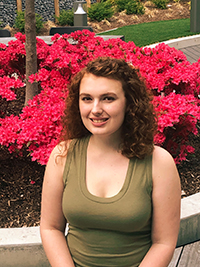Kira Lemke and Natalie Gonzales are both Biology majors with minors in Neuroscience at the University of Washington Bothell — and they are both, not surprisingly, passionate about the brain, body and behavior.
They also both received Mary Gates Research Scholarships this past winter quarter.
Lemke, a second-year student, said she has loved biology for so long that it has become part of who she is, not just an interest she holds. “In grade school, I was definitely ‘that kid’ who everyone thought would become a scientist,” she said. “But hey, they weren’t wrong.”
Now, as a college student and Mary Gates scholar, Lemke has been conducting research with Dr. Douglas Wacker on the variation of vocalization in a bird called Steller’s Jay (Cyanocitta stelleri).
Gonzales, a third-year student, said she has always been interested in the brain. Her favorite memory from high school was during a lab where she was able to hold a sheep brain in her hands. “It was shockingly small and insanely cool,” she said.
Through her Gates scholarship, she is studying human brains with the intent of replicating the process and side effects of neurodegenerative diseases such as Alzheimer’s and Parkinson’s.
Opening the door

When Gonzales first started college, she had planned on becoming a nurse. “My number one goal in life has always been to help people in some way, shape or form,” she said. Nursing school, however, taught Gonzales that what she loves most is lab work, not nursing as an occupation. She decided instead to pursue a career in biological research.
“Biology is one of those areas where you really need to get your foot in the door and have experiences, which is why the Mary Gates Scholarship was so attractive,” she said. “Both for the experience it offers and the funds. It’s hard to go to school full time and work.
“The Mary Gates Scholarship has helped alleviate the pressure and guilt I felt about trying to pursue higher education and survive day-to-day life.”
Gonzales is sponsored by Dr. Michael Stiber, professor in the School of STEM’s Division of Computing & Software Systems. With his assistance, she plans to create waves of activity in a system called Graphitti to see how spike-timing-dependent plasticity (a biological process that adjusts the strength of connections between brain neurons) changes when consecutive sequences of spikes are placed on the system.
“I am personally interested to find out if these changes could replicate the process and side effects of chronic neurodegenerative diseases like Parkinson’s or Lewy body dementia,” Gonzales said. “The scariest thing about these diseases is that there isn’t a cure, and it can be a chronic, long-term condition that not only affects the person diagnosed but everyone in their lives.
“Even if we never find a cure for these diseases, I think it is still helpful to learn as much about them as possible. Maybe we find it can be prevented — or maybe the knowledge gained could apply to cancer research. There are just so many possibilities that come with expanding knowledge.”
Gonzales recognizes this is a lofty goal but said if the least she can do is open the door for someone else to get to that goal, then she is fine with that.
Laying the groundwork

Lemke, who is also minoring in Marine Biology, is analyzing the call types of multiple subspecies of Steller’s Jay across North America and Central America. She set out to determine whether their vocalizations show geographical variation in acoustic structure.
Dr. Douglas Wacker, assistant professor in the School of STEM’s Division of Biological Sciences, said it was clear from the beginning that Lemke was most interested in animal intelligence and cognition. “Kira is analyzing what is potentially complex behavior in a bird family known for its intelligence,” he said. “She is a tenacious and hard-working scholar student who shows a real knack for thinking across disciplines.”
Lemke explained that, in comparison to other birds, the Steller’s Jay has a lot of call types. “Most birds have maybe two or three. Steller’s Jays have at least 16,” she said. “My research was about figuring out whether or not the calls varied significantly.”
To do so, Lemke went to an online library where people upload bird calls. Unlike other birds that can be observed almost anywhere, Steller’s Jays are more difficult to find. By analyzing recorded bird calls, she was able to listen to the sounds of Steller’s Jays in different regions.
Her results found that the vocalizations do vary significantly, depending on the region. “There are a variety of reasons this could be happening,” Lemke said. “A Steller’s Jay in the Pacific Northwest is going to be around lots of really big trees whereas a Steller’s Jay in California is going to be around more open spaces. Different kinds of calls travel better in different habitats.
“Another reason could be that as the jays migrate and establish themselves in new areas the calls could have changed over time due to natural selection. Or the jays could be learning the calls from other jays in different regions.”
Lemke’s research is laying the groundwork for future scientists to study Stellar Jays. “Knowing that variation between calls exists allows researchers to move forward with more specific questions — such as how they vary and what the implications of the variance are,” she said.
“Being able to find something in my studies and produce new knowledge was super exciting. I will definitely apply the skills I learned in future research.”
Showcasing accomplishments
Lemke will be sharing her findings at the UW Undergraduate Research Symposium on May 21, and Gonzales will be presenting her research at next year’s symposium.
“I am really looking forward to showcasing and presenting my research at the symposium and owning that I have done great work through the scholarship,” Gonzales said.
“And I would like to say thank you to the Mary Gates program because it wouldn’t be possible to pursue such a project without it.”
The Mary Gates Research Scholarships are competitive scholarships intended to enhance the educational experience of undergraduate students at the University of Washington while they are engaged in research guided by faculty. Established in 1995 by Bill and Melinda Gates, the scholarships honor the memory of Bill’s mother, Mary Maxwell Gates (1929-1994).



